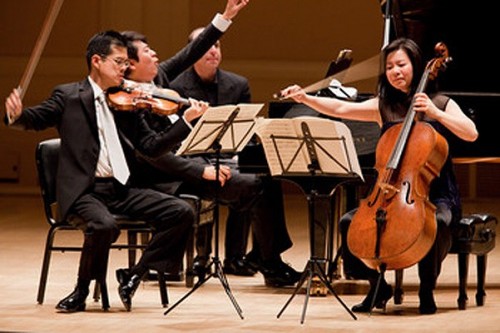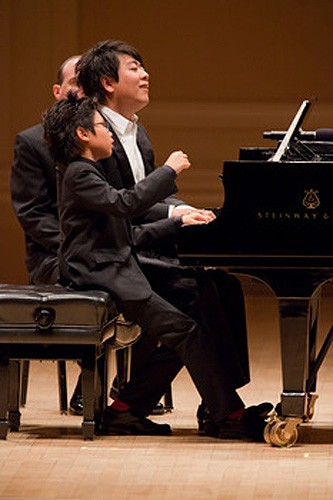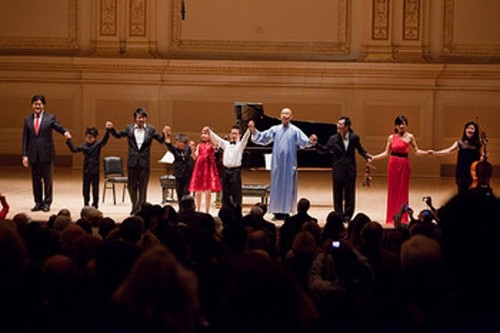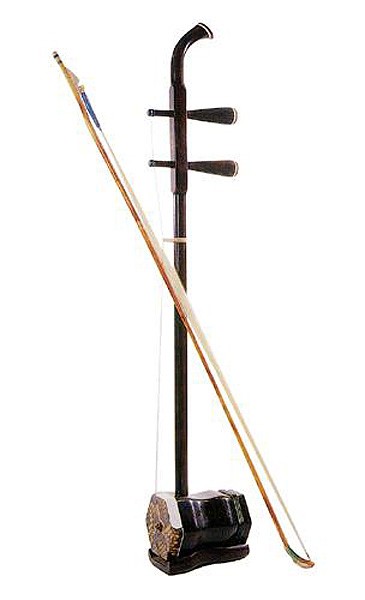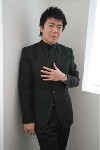Lang Lang and Friends at Carnegie Hall
Ancient Paths/Modern Voices in New York
By: Susan Hall - Oct 28, 2009
Lang Lang and Friends
Carnegie Hall, October 27, 2009
Lang Lang, Piano
David Chan, Violin
Guo Gan, Erhu
Hai-Ye Ni, Cello
GeQun Wang, Tenor
Marc Yu, Piano
Jingyi Zhang, Piano
Scholars from the Lang Lang International Music Foundation
·· Anna Larsen, Piano
·· Charlie Liu, Piano
·· Derek Wang, Piano
SCHUBERT Rondo in A Major, D. 951
HUA YANJUN The Moon Reflected on the Er-Quan Spring
HUANG HAIHUAI (arr. GUO GAN) Horse Racing
GU JIANFEN That is me, Mama
TRAD. Ussuri Fishermen's Song
MACK WILBERG Fantasy On Themes From Bizet's Carmen
TCHAIKOVSKY Piano Trio in A Minor, Op. 50
At Carnegie Hall from October 21 to November 10, Ancient Paths Modern Voices, a Festival celebrating Chinese Culture, is being presented. Last evening, pianist Lang Lang performed chamber music in the company of others and was also a kindly, encouraging impresario to the very young.
"All of me. Why not take all of me?" If Ken Russell's "Lisztomania" gives us an anywhere near accurate picture of the composer Liszt as performer, Liszt was much more over the top than Lang Lang, who continuously and physically emotes at the keyboard as he performs. Liberace and Liszt in their exaggerated presentation thrill us, yes, but also push us away -- too much to take in one sitting.
Lang Lang pulls us in. Perhaps because, when performers invite us in today, they often are giving us all of them, not faux intimacy. On his blog, Lang Lang shares a moving letter to his mother, thanking her for her warmth and love. Watch him on YouTube in "Gone Mad" -- he's wonderfully fun and engaging. Whether or not you like the drama as he performs, he is very much here and now. For me, he does not obscure the music. From the Western romantics on, and in Far Eastern works with which I'm not familiar, he completely engages. He is an artist unlike any other - the Maria Callas of the piano?While I may disagree with his sometmes martial upper registers, his interpretation is clearly in the service of music.
At Carnegie, Lang Lang's humility and generosity were amply on display. This was an evening in which he would introduce us to his friends -- young performers on the cusp of success, others of great talent who had not shared his luck. Mrs. Arthur Schwartz ("Dancing in the Dark") used to sit with her young son at the piano while he practiced, because he got so lonely staring at his Czerny exercise book. Introducing 10 year old Marc Yu, who was making his Carnegie debut, Lang Lang was a caring paternal presence. While Mr. Yu is familiar to the concert stage having appeared in solo recitals and on numerous A list TV shows like Oprah and Leno, sitting with his mentor to perform Schubert for four hands, you sensed a comfortability-- the gift of the second pair of hands, playing the lower registers, providing support, letting the youngster shine. As their bodies moved together, the bond and inspiration was apparent. Lang Lang tells us that Schubert composed this four hand music to be played among friends, so the stage was perfectly set for evening.
Lang's father, Lang Gueren, was referred to as "uber-dominant" when Lang Lang was a student at the Curtis Institute of Music. Not only did he want to sit in on his son's lessons, he also spied on other students to make sure that his son maintained Number One status. In the past Lang Gueren has played encores on the erhu with his son, but this evening we heard another artist, Guo Gan, perform a gorgeous Hua Yanjun piece, slow and poignantly melodic, and "Horse Racing," surprisingly reminiscent of Foster's "Camptown Ladies" --but with even more clear evocation of horses hooves on the erhu. Lang Lang added percussive horsebeats on the piano.
The erhu is a Chinese 2-stringed, vertical fiddle popular in Southern China during the Sung Dynasty. It is still the most popular bowed instrument in today's Chinese music. A vertical post with a fingerboard goes through the sides of a resonator made of snakeskin at its base, which results in a unique "whining" tone color. The bow is placed between its two strings. In China, blind street musicians play the instrument on the streets. In New York, if you're lucky, you can catch the erhu being played in a subway station.
The tenor GeQun Wang performed two more folk songs, "That is Me, Mama," and an Ussuri fisherman's song, accompanied by Lang Lang on the piano. This handsome, six four tenor sings beautifully, and apparently the big opera divas can't wait to partner with him. For Lang Lang, any role, from supportive accompaniest to super star is welcome.
Up next were three tiny pianists whose studies Lang Lang is underwriting through his foundation. They played a contemporary rendition of Bizet's "Carmen" on two pianos for eight hands -- or 40 fingers! Lang Lang, ever sensitive to the needs of the tiny ones, placed Jingyi Zhang, a more seasoned performer, on the bench as the fourth set of hands. And for the two tinys who were alone on their side of the stage, Lang Lang himself sat on a bench, keeping time, occasionally conducting, always encouraging.
Is Lang Lang a Trojan horse sneaking in music from the Far East? If so, he will do this in his own inimitable style -- slowly, accustoming our ears, encouraging us to open up for all these marvellous Asian performers who have come to our shores, hearing them extend their Western repertoire to the music of Asia. Some say because there is such variety in Chinese music there is no such thing as Chinese music. The special qualtiies of some instruments --the erhu this evening, and also modalities odd to our ear, suggest we may inadvertently open up to unfamiiar and strange sounds.
Like Alan Gilbert, the new music director of the New York Philharmonic, Lang Lang surrounds himself with friends to produce more exciting and beautifully rendered performances. He also ends his programs with more familiar repertoire, in this case the Tchaikovsky Piano Trio in A Minor, a brave endeavor because we are so familiar with the Vladimir Horowitz, Isaac Stern, Rostropovich interpretation. Last evening's Trio was wonderfully performed and the principal cellist of the Philadelphia Orchesrra, Hai-Ye Ni, was stunning in her solo moments.
While Lang Lang has written touchingly of the problems which parental pushing creates, including a moment when his career was languishing and his father told him to kill himself by jumping off a balcony or taking an overdose of pills, highly talented and disciplined artists give us such pleasure that one hopes this can be achieved without such periilous pushing. Maybe the fishing industry will invent protection for young hands, so young talent can relax fishing with their playmates from time to time without ending their young careers, injured by a fishhook.
Here's the trick. You push until the passion kicks in. But how long do you wait? When do you decide the passion is not there? When an artist so clearly loves his art, the passion helps heal the interior wounds. Clearly, Lang Lang and his friends have a passion for music which trumps all. What a gift to us.

